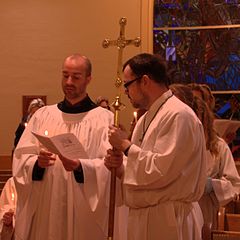Candlemas
| Candlemas Candlemas Day |
|
|---|---|

Blessing of candles on Candlemas at an Episcopal Church in the United States
|
|
| Also called | Feast of the Purification of the Blessed Virgin Mary Feast of the Presentation of our Lord Jesus |
| Observed by | Christians |
| Significance | Commemoration of the presentation of Jesus at the Temple |
| Observances | Having candles blessed for the year during a Mass or Service of Worship |
| Date | February 2 |
| Frequency | Annual |
| Related to | Christmastide, Epiphanytide |
Candlemas, also known as the Feast of the Purification of the Blessed Virgin Mary and Feast of the Presentation of our Lord Jesus, is a Christian holiday commemorating the presentation of Jesus at the Temple. It falls on February 2, which is traditionally the 40th day of the Christmas-Epiphany season. While it is customary for Christians in some countries to remove their Christmas decorations on Twelfth Night (Epiphany Eve), those in other Christian countries historically remove them on Candlemas. On Candlemas, many Christians (especially Anglicans, Methodists, Lutherans, Orthodox and Roman Catholics) also bring their candles to their local church, where they are blessed and then used for the rest of the year.
The Feast of the Presentation is one of the oldest feasts of the Christian church, celebrated since the 4th century AD in Jerusalem. There are sermons on the Feast by the bishops Methodius of Patara (died 312), Cyril of Jerusalem (died 360), Gregory the Theologian (died 389), Amphilochius of Iconium (died 394), Gregory of Nyssa (died 400), and John Chrysostom (died 407). It is also mentioned in the pilgrimage of Egeria (381 - 384), where she confirmed that the celebrations took place in honor of the presentation of Jesus at the Temple.
XXVI. [The Purification of the Blessed Virgin Mary.] But certainly the Feast of the Purification is celebrated here with the greatest honour. On this day there is a procession to the Anastasis; all go in procession, and all things are done in order with great joy, just as at Easter. All the priests preach, and also the bishop, always treating of that passage of the Gospel106 where, on the fortieth day, Joseph and Mary brought the Lord into the Temple, and Simeon and Anna the prophetess, the daughter of Famuhel, saw Him, and of the words which they said when they saw the Lord, and of the offerings which the parents presented. And when all things have been celebrated in order as is customary, the sacrament is administered, and so the people are dismissed.
...
Wikipedia
